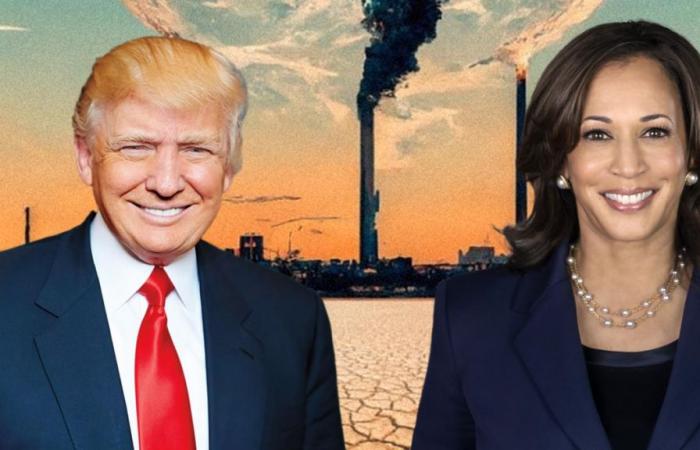In the middle of the electoral war between Kamala Harris and Donald Trump, a key subject is missing: ecology.Image: watson
In the middle of the electoral war between Kamala Harris and Donald Trump, a key subject is missing: ecology.
03.11.2024, 07:3404.11.2024, 10:37
Follow me
More from “International”
In this presidential campaign, neither Kamala Harris nor Donald Trump said a word about the climate, despite hurricanes Helene and Milton which hit the south of the country, gutting hundreds of homes, taking lives and destroying the homes of thousands of Americans.
After these natural tragedies, we might have thought that priority would be given to the subject of climate effects. Jay Inslee, Democratic Governor of Washington, confided to the Guardianon October 17:
“The increasing frequency of these disasters reinforces the desire of Americans to fight against them”
Indeed, even if nearly 40% of Americans reject the scientific consensus and deny the existence of anthropogenic change, Uncle Sam’s citizens are beginning to be interested in the effects of global warming.
In April of this year, a poll showed that half of Americans are now concerned about climate shocks. Study finds percentage of Americans alarmed or concerned has increased from 40% in 2013 to 56% in 2023. An upward trend, although sluggish.
“You are absolutely right, the subject has completely disappeared from the debate,” says David Sylvan, professor at the Geneva Institute of Advanced International Studies (IHEID).
“The biggest scam in the world”
Trump isn’t just ignoring the climate, he bluntly calls it “the biggest scam in the world.” Better, he announced, in his Agenda 47 program, that he will once again withdraw from the Paris climate agreements, if he is elected. In addition, all binding directives aimed at reducing greenhouse gas emissions will be swept away, promises the Republican candidate.
The former president also plans to invest in the energy sector, whatever its origin, and lift restrictions on oil, coal and gas production. A boon for Silicon Valley and its tycoons, who are seeking to reopen coal-fired power plants to power their artificial intelligence.
Democrats look away
For their part, the Democrats do not consider it useful to focus on ecology either. Kamala Harris draws on the key themes of this campaign, confirms David Sylvan. He emphasizes:
“The closer the campaign gets to the fateful date, the more visible we see the major issues: democracy, minorities, abortion. We have to put out the fire first before tackling other problems.”
The Democratic candidate, during her various interventions, almost never mentions any climate policy and has often remained vague on this subject.
On September 10, during a debate, Harris said she would not ban the controversial method of hydraulic extraction (“fracking”). An attempt to tilt Pennsylvaniaa swing state, these pivotal states so precious for this presidential election. The Democratic candidate must please the Republicans torn between her and Trump and to do this, Harris must remain moderate on the climate subject. “This prevented her from being too caught in a pinch, because if she wanted to attract blue-collar workers from Pennsylvania, she should not oppose ‘fracking’,” analyzes the professor, originally from Chicago.
A vote of greens who can weigh
If the subject has disappeared from the debate, forgetting ecology could nevertheless be a strategic deficiency for both Trump and Harris. Still according to the Guardianthe vote of climate-conscious people may have made the difference between Biden and Trump in 2020.
A recent poll dating from September shows that ecology is the poor relation of these elections: if the economy remains of course the most concerning theme for 81% of voters, ecology is at the bottom of the ranking in the “very important” for the November 5 election.
So much so that Harris backed away from environmental projects she supported during her 2019 presidential campaign, such as the Green New Deal (the appropriate term for a new climate policy) and requiring all new vehicle sales to ‘be electric.
In an America obsessed with its place as an industrial superpower, green speeches have little resonance against the dollar. Logical, when we are talking about a very polluting country – the second largest today after China. But the political (and climatic) trajectory of the United States has enormous repercussions on the rest of the planet.
An echo of the speech of Secretary of State Anthony Blinken, who formulated his words in 2021:
“If America fails to take global leadership in tackling the climate crisis, there won’t be much of the world left.”







